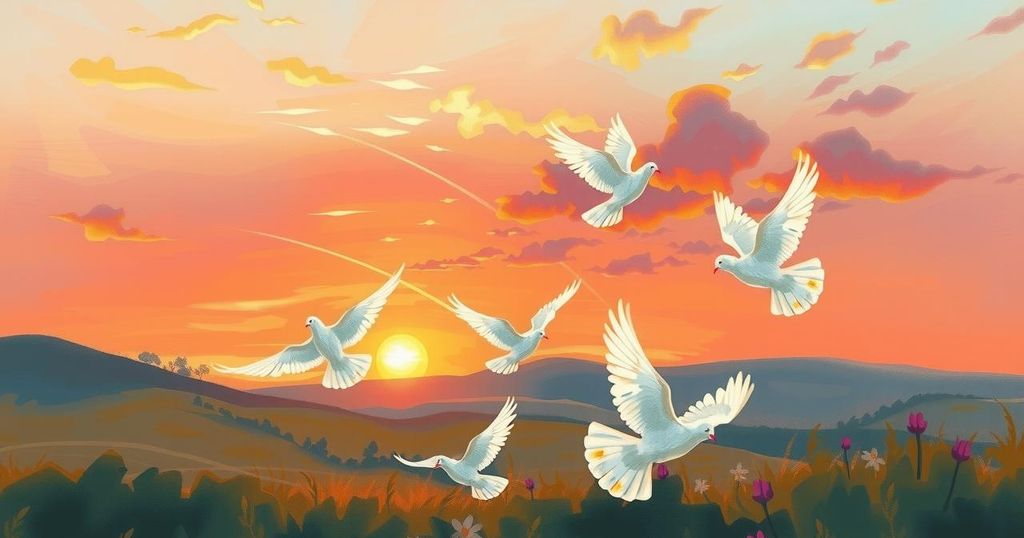Global news
AFRICA, ANGOLA, BUKAVU, CIVIL WAR, CONFLICT RESOLUTION, CONGO, CONGO (KINSHASA), DEMOCRATIC REPUBLIC OF CONGO, DRC, EM, FELIX TSHISEKEDI, GOMA, KINSHASA, M23, NORTH AMERICA, REGIONAL COOPERATION, RWANDA, SADC, SOUTHERN AFRICAN, TINA SALAMA, TSHISEKEDI, UNITED STATES, WEST AFRICA
Jamal Walker
0 Comments
Angola to Host Direct Peace Talks Between Congo and M23 Rebels on 18 March
Direct peace talks between the Democratic Republic of Congo and M23 rebels will begin on 18 March in Angola. The Angolan presidency announced its intention to mediate and resolve tensions, particularly considering allegations against Rwanda for its involvement with M23. The ongoing conflict has resulted in significant humanitarian crises, with thousands dead and many displaced.
On 18 March, direct peace talks between the Democratic Republic of Congo and the M23 rebels will commence in Angola’s capital, as announced by the Angolan presidency. While the Congolese presidency has acknowledged the receipt of this proposal, they have not confirmed their participation as of yet. Angola, aiming to mediate a ceasefire, has been addressing the tensions between Congo and Rwanda, which is accused of supporting the M23 group—a claim Rwanda denies.
Despite Congo’s previous reluctance to engage directly with the M23, the government acknowledged the importance of the Angolan mediation effort. Tina Salama, spokesperson for President Felix Tshisekedi, confirmed receipt of the invitation from Angola but refrained from confirming a commitment to the talks. The M23 leader, Bertrand Bisimwa, emphasized the necessity of these negotiations, labeling them “the only civilized option to resolve the current crisis.”
In addition to the upcoming talks, eastern DRC’s situation will be discussed during an extraordinary Southern African Development Community (SADC) summit chaired by Zimbabwean President Emmerson Mnangagwa. This video conference aims to address the role of regional forces in eastern Congo as the conflict escalates, with the M23 having captured Goma and Bukavu while advancing towards smaller villages.
The conflict’s roots trace back to Rwanda’s 1994 genocide, compounded by tensions over control of DRC’s rich mineral resources, including coltan, cobalt, copper, and lithium. These minerals are imperative for the development of new technologies and green energy. Since January, over 7,000 people have reportedly died and 600,000 displaced according to the United Nations Office for the Coordination of Humanitarian Affairs (Ocha).
Human Rights Watch has raised alarms regarding a diminishing civic space in M23-controlled regions, where human rights activists and journalists face pressure and threats, including documented assassinations. This repression, previously localized, is now spreading into North and South Kivu, with potential involvement from Rwanda.
Concerns are mounting over the possibility of a broader regional conflict, as neighboring countries including Burundi, Uganda, and South Africa have deployed military forces in eastern DRC, reminiscent of the devastating Congo wars of the 1990s and early 2000s which resulted in millions of deaths.
The announcement of direct peace talks between the Democratic Republic of Congo and M23 rebels marks a pivotal moment in ongoing tensions exacerbated by regional dynamics and historical grievances. While Angola’s mediation efforts highlight the necessity for dialogue, the deteriorating humanitarian situation and reports of human rights violations underscore the complexities at play. The forthcoming discussions represent a critical opportunity for de-escalation and the restoration of stability in the region.
Original Source: www.rfi.fr




Post Comment